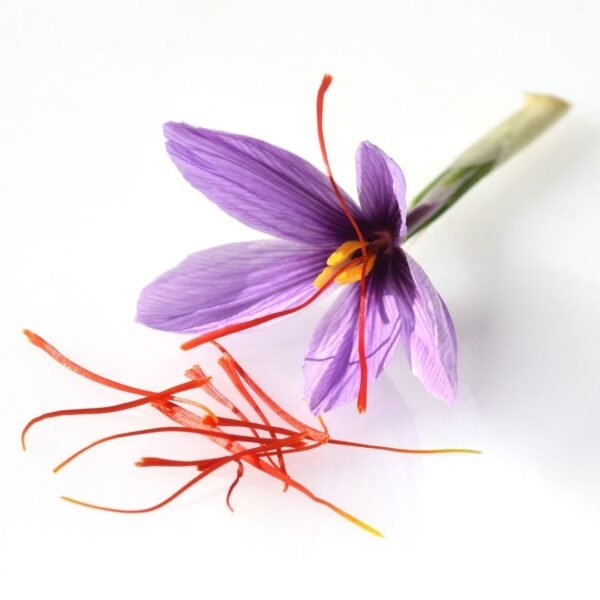What Is Saffron? Health Benefits, Uses & Tips
Introduction: What is Saffron?
Saffron, also known as Kesar or Crocus sativus L., is a precious spice that originated in Asia. For thousands of years, it has been used not only as a flavoring and coloring agent in food but also for its medicinal and health-boosting properties.
Saffron comes from the stamen of the crocus flower. It has a unique, earthy, and slightly sweet flavor, making it popular in dishes, drinks, and desserts.

Top 5 Health Benefits of Saffron (Kesar)
1. Powerful Antioxidant and Anti-Inflammatory
Kesar is rich in antioxidants like crocin, safranal, and carotenoids, which help fight free radicals and reduce inflammation. These properties may protect cells from damage and support overall wellness.
Example: Studies show saffron can reduce oxidative stress in people with type 2 diabetes.
2. Helps Relieve PMS Symptoms
Kesar may help improve mood swings, anxiety, and mild depression related to premenstrual syndrome (PMS). Its active compounds have a positive effect on emotional symptoms, making it a natural aid during menstrual cycles.
3. Supports Weight Loss
Kesar may help reduce appetite and support healthy weight management. Research indicates that taking kesar extract can lower BMI, waist size, and overall body fat when used along with a balanced diet.
4. Improves Mood and Fights Depression
Kesar has natural mood-boosting properties. Compounds like crocin and safranal increase levels of serotonin, dopamine, and norepinephrine in the brain, helping reduce symptoms of depression and anxiety.
5. May Support Brain Health and Alzheimer’s Disease
Kesar may be as effective as some prescription medications for mild to moderate Alzheimer’s disease. It has been shown to improve memory, cognitive function, and slow the progression of the disease in small studies.
How to Use Saffron
Saffron is usually sold as threads or ground powder. Because it is very potent and expensive, only a small amount is needed in cooking or drinks.
Ways to use Kesar:
Add a few threads to rice dishes like Biryani or pilaf for color and flavor.
Make kesar milk or latte by adding threads to warm milk.
Mix kesar into baked goods like cakes and bread.
Use kesar in milk-based desserts such as puddings or ice cream.
Sprinkle kesar in soups or stews like bouillabaisse for a subtle aroma and color.
Safety and Side Effects
Kesar is generally safe when used in food or drinks. Possible side effects include:
Allergic reactions in sensitive individuals (rash, itching, or stomach upset).
Excessive doses of kesar supplements may cause nausea or dizziness.
For daily use, small amounts of kesar in food or milk are safe and effective.
Conclusion
Saffron (Kesar) is a golden spice with powerful health benefits. It can improve mood, support weight management, relieve PMS symptoms, act as an antioxidant, and even support brain health. Adding kesar to your diet in small amounts is a simple way to enjoy its healing and wellness properties naturally.
FAQs About Saffron
Q1. What are the main health benefits of kesar?
Kesar may help with mood improvement, weight loss, PMS relief, memory support, and reducing inflammation.
Q2. Can saffron help with weight loss?
Yes, research suggests saffron reduces cravings and appetite, supporting weight management.
Q3. How much saffron should I consume daily?
A pinch (5–10 threads) is usually enough in food or milk. Supplements should only be taken after consulting a doctor.
Q4. Is saffron safe for everyone?
Yes, when used in food amounts. However, high doses (especially in supplements) should be avoided by pregnant women or people with medical conditions without medical advice.
Q5. Why is saffron so expensive?
Because it takes about 75,000 flowers to make just 1 pound of saffron, harvesting is labor-intensive, making it the most expensive spice in the world.
Know More About Saffron: Click here
